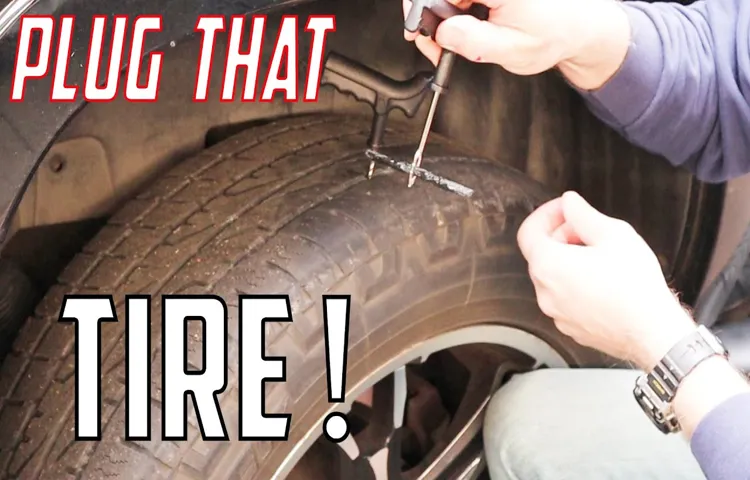Have you ever had a flat tire and wondered how much it should cost to plug it? It’s a common question that many drivers have when faced with this situation. The answer varies depending on several factors, including the type of tire, the severity of the damage, and the location of the repair shop. In this blog post, we’ll explore the different factors that can determine the cost of plugging a tire, and what you can expect to pay.
So sit tight, buckle up, and let’s dive in!
Table of Contents
Understanding Tire Plugging
If you’ve got a punctured tire, you may be wondering how much it should cost to have it plugged. Generally, the cost varies depending on where you go for the repair. Be prepared to pay anywhere from $10 to $40 for a tire plugging service, with pricing generally reflecting the shop’s level of expertise and quality of equipment.
However, keep in mind that plugging a tire is a temporary fix and should not be treated as a permanent solution. You should still plan on getting a new tire in the near future to ensure your safety on the road. Additionally, factors such as the size and location of the puncture, the type of tire, and the condition of the tire can all affect the cost of plugging.
It’s always a good idea to consult with a professional tire technician to get an accurate quote and make sure your tires are in good shape.
What is tire plugging and why is it necessary?
Tire plugging is a quick and cost-effective way to fix small punctures in your tire’s tread. It involves inserting a plug into the damaged area to seal the hole and prevent air from leaking out. The process of tire plugging is necessary because punctured tires can result in flat tires, which can be inconvenient, expensive, and dangerous if they occur while driving.
Additionally, plugging a tire can extend the life of your tire, saving you money in the long run. It’s important to note that not all types of damage can be fixed with tire plugs, and it’s crucial to have a professional assess the damage to your tire before attempting to plug it. Overall, tire plugging is a useful and practical solution for small punctures that can extend the life of your tire and prevent potential hazards on the road.
Can any tire be plugged or repaired?
Tire plugging is a popular method used to repair punctures or small leaks on tires. However, not all tires can be plugged or repaired. For instance, tires with sidewall damage or that have punctures larger than a quarter of an inch in diameter cannot be plugged.
The location of the puncture or damage also matters. A puncture located on the tread area is repairable, while one on the shoulder or sidewall may not be. It is crucial to consider safety first and stop using a tire as soon as you notice any damages.
A professional tire technician can assess the extent of the damage and determine if it can be plugged or if you need to replace the tire. It is also worth noting that not all plugs are created equal; some may compromise tire safety and decrease its lifespan. That’s why it’s essential to have your tire checked by a professional before attempting any DIY methods.
Remember, ensuring that your tires are in good condition enhances your overall safety and prolongs tire life.
Factors Affecting Tire Plugging Costs
If you’re wondering how much it should cost to plug a tire, there are a few factors that can affect the final price. Firstly, the location of the puncture is an essential consideration. If the nail or screw or any object has pierced the tire to a point where it can’t be repaired, it has to be replaced altogether, which can cost more.
Secondly, the size of the tire can influence the cost. Larger tires, such as those found on trucks and SUVs, cost more to replace than smaller ones. Thirdly, geographical location can also impact tire plugging costs.
For example, the cost of tire repair may vary depending on whether you live in a rural or urban area and the costs of running a tire shop in that specific area. Finally, the brand and type of tire play a crucial role in determining tire plugging costs. Brand name tires will generally have a higher repair cost than cheaper ones.
Ultimately, it’s best to shop around for tire repair services and get quotes from different providers before making a final decision.
Type of tire and its size
When it comes to tire plugging costs, several factors affect how much you can expect to pay. One of these factors is the type of tire you have. Different tires have different plugging requirements, and this can impact the overall cost.
For example, a larger or more specialized tire may require a more complex and time-consuming repair, which can increase the price. Another factor that impacts tire plugging costs is the size of the tire. Like with type, larger tires generally cost more to repair due to the additional work and materials required.
Ultimately, the cost of plugging a tire will depend on a variety of factors, including the severity of the damage, the type of tire, and its size. It is essential to consult with a professional to get an accurate estimate before agreeing to any repairs. By doing so, you can ensure that you are making an informed decision and not overpaying for the service you require.
Severity and location of the puncture
When it comes to plugging a punctured tire, various factors come into play, affecting the total cost of the service. The severity and location of the puncture are among the primary factors that dictate the cost of tire plugging. For instance, a small hole in the tread area can be plugged relatively easily and quickly, costing less.
On the other hand, a larger puncture near the sidewall or shoulder of the tire may require special attention and time-consuming repairs, increasing the cost. Additionally, some tire shops charge extra for repairing run-flat or low-profile tires due to their complexity. Other factors that may influence the cost include the type of vehicle, the quality of the repair materials, and the urgency of the service.
Ultimately, it’s essential to have a professional assess the damage and provide you with a detailed quote that includes all necessary repairs and fees. Remember, ignoring a damaged tire could lead to more severe problems down the road, so it’s crucial to address any puncture promptly.
Cost of labor and materials at different service centers
When it comes to tire plugging costs, there are several factors that can affect the overall price. Firstly, the cost of labor can vary depending on the service center you choose. Some service centers may charge a higher hourly rate for their technicians than others, which can add up quickly.
Additionally, the cost of materials can also impact the price of the service. If a service center uses high-quality materials, such as a top-of-the-line tire plug, it may cost more than a cheaper option. Another factor is the severity of the tire damage.
If the damage is minor, it may be a quick and inexpensive fix. However, if the tire is severely damaged, it may require a complete replacement, which can be much more expensive. Overall, it is important to do your research and compare prices between different service centers to ensure you are getting the best value for your money.
Average Costs of Tire Plugging
If you’ve ever had a flat tire, you know how frustrating and inconvenient it can be. Fortunately, if the puncture is small enough, it can often be repaired by plugging the tire. The cost of a tire plug can range anywhere from $10 to $40, depending on where you go and the type of tire you have.
Most tire repair shops will charge around $25 for a tire plug, which includes removing the tire, repairing the puncture, and remounting the tire. If the damage is more severe and requires patching, the cost may be slightly higher, but still significantly less than the cost of a new tire. Keep in mind that while a tire plug can be a quick and easy fix, it’s not always the best solution, especially for larger punctures or sidewall damage.
Always consult a professional for advice on the best course of action for your specific situation.
National and regional averages based on industry reports
If you’ve ever experienced a flat tire, you know the hassle that comes with it. One solution to fix a flat is by using a tire plug. The average cost of tire plugging can vary depending on the state and region you live in.
Industry reports suggest that the national average cost of tire plugging ranges from $20 to $30. However, it’s important to note that prices can vary greatly depending on the individual shop or technician you go to. Some shops may charge less, while others may charge extra fees for additional services.
A good way to ensure you’re getting a fair price is to research the cost of tire plugging in your area before committing to any specific shop. By doing so, you can save money and ensure you’re getting a good deal for your tire repair needs.
Comparison of prices at major tire service centers
When it comes to getting your tires serviced, one of the most common issues you may encounter is a flat tire. In these cases, you may be able to simply have the tire plugged rather than paying for a brand new one. But how much can you expect to pay for this service? We’ve looked into the average costs of tire plugging at major tire service centers, including Firestone, Goodyear, and Discount Tire.
On average, you can expect to pay around $20 to $30 for a tire plug at these locations. However, prices can vary based on factors like the type of tire you have, the severity of the damage, and your location. It’s always a good idea to call ahead and get an estimate before heading to the shop.
By doing your research, you can make sure you’re getting a fair price for the service you need.
How to Save Money on Tire Plugging
Are you wondering “how much should plugging a tire cost?” If so, you are not alone. Tires are an essential part of any vehicle, and a flat tire can be quite frustrating. The cost of plugging a tire varies depending on several factors, such as the location of the puncture and the type of tire.
In general, a tire plug should cost between $20-$30, but this can vary based on your location and the shop you visit. However, it is essential to remember that plugging a tire does not always mean that it is safe to continue driving on it. If the puncture is in the sidewall or the tread is too thin, you may need to replace the tire entirely.
That is why it is always a good idea to have your tires regularly inspected by a professional mechanic to ensure that they are in good condition and safe to drive on. In conclusion, while the cost of plugging a tire may vary, it is always better to err on the side of caution and have a professional inspect your tire to ensure your safety on the road.
Preventive measures to reduce the chances of punctures
Tire punctures are not only frustrating but can also be expensive, especially if you have to purchase a brand new tire. However, there are preventive measures you can take to reduce the chances of getting a puncture. Regularly checking your tire pressure and maintaining the correct tire pressure is crucial in preventing punctures.
Overinflated or underinflated tires are vulnerable to punctures because they increase the risk of a blowout. Secondly, trimming trees around your parking spot or driveway can prevent punctures caused by sharp tree branches. Additionally, driving cautiously and avoiding potholes and debris on the road can significantly reduce the chances of getting a flat tire.
If you frequently drive on rocky or unpaved roads, invest in high-quality tires with thicker treads to prevent punctures. Lastly, inspecting your tires regularly for any signs of wear or puncture can help you detect and fix any issues before they escalate. By adopting these preventive measures, you can save money on tire plugging and extending the lifespan of your tires.
Negotiating prices, discounts, and warranty coverage
If you’re ever faced with a flat tire, the cost of plugging it back up can be overwhelming. However, with a bit of negotiating, you can save yourself some money. When speaking to a tire repair technician, make sure to ask if they offer any discounts for their services.
Additionally, try bargaining with them to see if they can drop the price a bit. If you bought your tires from the same location, ask if they can offer a price cut for being a returning customer. Finally, when purchasing tires, always ask about the warranty coverage to ensure you’re covered in case of any future issues.
By utilizing these negotiating tactics, you could end up saving yourself some money in the long run. The keyword for this article is “Tire Plugging”.
Conclusion
In the world of tire repair, what goes around comes around – or rather, what gets plugged must be paid for! Jokes aside, the cost of plugging a tire varies based on a number of factors such as the type of tire, extent of damage and location of the puncture. So, the bottom line is: there’s no one-size-fits-all answer to the question of how much it should cost to plug a tire. However, by doing some research, comparing prices and seeking out reputable professionals, you can ensure that you’re getting a fair and reasonable deal.
Remember, safety on the roads is priceless, so don’t skimp on necessary repairs for your vehicle’s tires.”
FAQs
What factors determine the cost of plugging a tire?
The cost of plugging a tire can be affected by factors such as the type of tire, the location and severity of the puncture, and the labor costs of the repair shop.
What is the average cost to plug a tire?
The average cost to plug a tire can vary, but it typically ranges from $10 to $30 per tire depending on the factors mentioned above.
Can I plug a tire myself and save money?
While it is possible to plug a tire yourself, it is important to consider the risks associated with improper tire repair. It is recommended to have a professional repair the tire for optimal safety.
Will my tire need to be replaced if it is plugged?
Not necessarily. If the puncture is within the allowable repair area and does not compromise the structural integrity of the tire, it can be safely plugged.
Is plugging a tire a permanent solution?
No, plugging a tire is considered a temporary fix and should be used as a short-term solution until the tire can be properly repaired or replaced.
Should all punctured tires be plugged?
Not all punctured tires can be safely plugged. It is important to have a professional inspect the tire to determine if plugging is a recommended solution.
Can I drive on a plugged tire?
Yes, a plugged tire can be driven on, but it is important to monitor the tire for any changes or issues that may arise. It is recommended to have the tire repaired or replaced as soon as possible.



